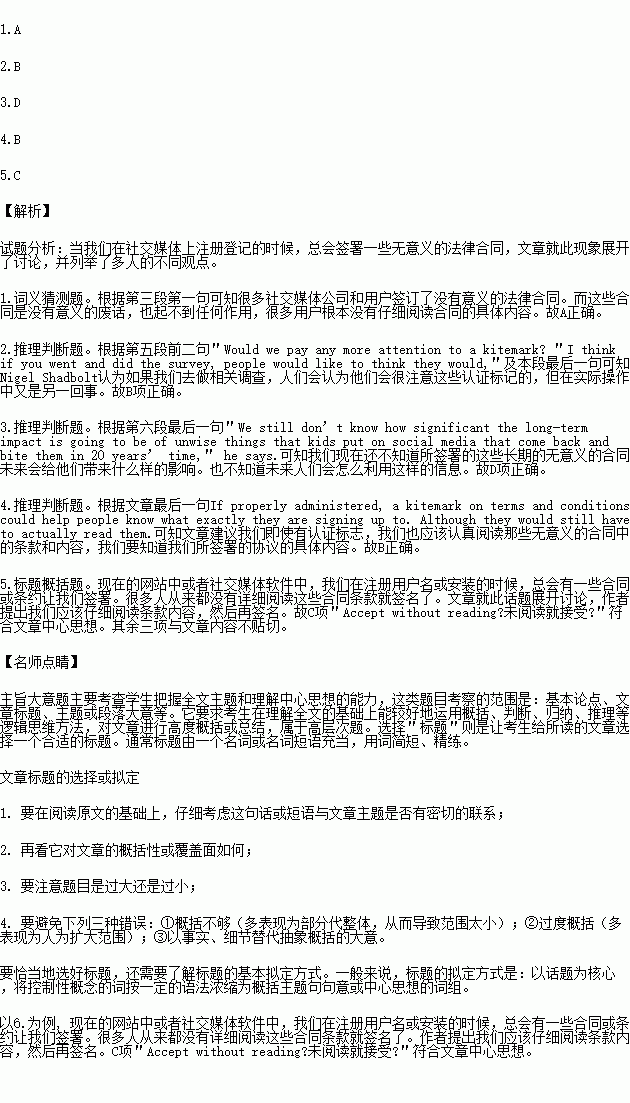题目内容
阅读理解。
Enough "meaningless drivel". That’s the message from a group of members of the UK government who have been examining how social media firms like LinkedIn gather and use social media data.
The House of Commons Science and Technology Committee’s report, released last week, has blamed firms for making people sign up to long incomprehensible legal contracts and calls for an international standard or kitemark (认证标记) to identify sites that have clear terms and conditions.
"The term and conditions statement that we all carelessly agree to is meaningless drivel to anyone," says Andrew Miller, the chair of the committee. Instead, he says, firms should provide a plain-English version of their terms. The simplified version would be checked by a third party and awarded a kitemark if it is an accurate reflection of the original.
It is not yet clear who would administer the scheme, but the UK government is looking at introducing it on a voluntary basis. "we need to think through how we make that work in practice," says Miller.
Would we pay any more attention to a kitemark? "I think if you went and did the survey, people would like to think they would," says Nigel Shadbolt at the University of Southampton, UK, who studies open data. "We do know people worry a lot about the inappropriate use of their information." But what would happen in practice is another matter, he says.
Other organisations such as banks ask customers to sign long contracts they may not read or understand, but Miller believes social media requires special attention because it is so new. "We still don’t know how significant the long-term impact is going to be of unwise things that kids put on social media that come back and bite them in 20 years’ time," he says.
Shadbolt, who gave evidence to the committee, says the problem is that we don’t know how companies will use our data because their business models and uses of data are still evolving. Large collections of personal information have become valuable only recently, he says.
The shock and anger when a social media firm does something with data that people don’t expect, even if users have apparently permission, show that the current situation isn’t working. If properly administered, a kitemark on terms and conditions could help people know what exactly they are signing up to. Although they would still have to actually read them.
1. What does the phrase " meaningless drivel" in paragraphs 1 and 3 refer to?
A. Legal contracts that social media firms make people sign up to.
B. Warnings from the UK government against unsafe websites.
C. Guidelines on how to use social media websites properly.
D. Insignificant data collected by social media firms.
2. It can be inferred from the passage that Nigel Shadbolt doubts whether _______.
A. social media firms would conduct a survey on the kitemark scheme
B. people would pay as much attention to a kitemark as they think
C. a kitemark scheme would be workable on a nationwide scale
D. the kitemark would help companies develop their business models
3. Andrew Miller thinks social media needs more attention than banks mainly because _______.
A. their users consist largely of kids under 20 years old
B. the language in their contracts is usually harder to understand
C. the information they collected could become more valuable in future
D. it remains unknown how users’ data will be taken advantage of
4. The writer advises users of social media to _______.
A. think carefully before posting anything onto such websites
B. read the terms and conditions even if there is a kitemark
C. take no further action if they can find a kitemark
D. avoid providing too much personal information
5. Which of the following is the best title of the passage?
A. Say no to social media?
B. New security rules in operation?
C. Accept without reading?
D. Administration matters!

